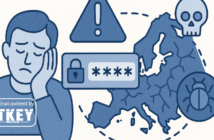The post was originally published in Russian on Startup of the Day. Alexander kindly agreed to republish what we think is of great value to our readers.
The most trendy insurance company in the American venture circles is Lemonade, the startup of the day that offers online insurance of real estate. They claim their rates and payouts are the most honest and transparent in the industry, but all startups do, nothing special here. Traditional business goes grumpy here and explains that Lemonade’s terms are objectively not that different from those of competitors. It’s difficult to comment who’s right or to know for sure from over the ocean, the product is too complex
Naturally, Lemonade only works online. The user visits the website, click-click – and the house is insured, another click-click the next day – report a loss, and the compensation is paid out automatically. Naturally, the idea about fraud comes to mind instantly – in theory, nobody stops a fraudster from getting insurance a day after the accident, and report the problem one week later. Lemonade talks about Smart Algorithms and artificial Intelligence that notice and don’t allow such behavior. Or, on the other hand, one can similarly commit frauds with traditional offline insurance companies, the compensation is included in market rates, the online model doesn’t really add any risks.
In 2017, going online doesn’t impress anybody anymore. Very roughly speaking, a regular insurance company collects rewards, pays out loss compensations, spends money on the office, salaries, and other regular expenditures, what’s left is revenue. Lemonade divides it’s earnings into two parts in advance: 80% for compensations, 20% for expenditures and revenue. If the compensations didn’t reach the expected limit in one year, the surplus goes to charity. The users are told that this rule is yet another proof of the company’s nobility: ‘we share the same side, we don’t want to save on compensations, this money won’t be ours anyway, we will compensate fairly,’ – and overall, the argument sounds convincing. Besides, there may be another psychological bonus: tricking fat owners of insurance businesses is very much okay, stealing money dedicated to charity is wasting one’s karma. Such thoughts probably won’t stop any self-aware fraudsters, but it will decrease the minor occasional fraud, exaggerations of actual losses, etc.
Lemonade has been operating for two years, it’s insured only 90 thousand hoses, it’s nothing on the USA level, but it’s an excellent result for such a short term. In December, the startup got an enormous round of investment of USD 120M at the value of USD 0.5B.
—
Here’s a rerun from 2018. The company is doing very well – IPO since July 2020, the present-day value of USD 1.8B, the revenue of slightly more than USD 100M a year. There’s really not a lot to add here.
Translation: Kostiantyn Tupikov

Alexander made his career in Russian internet companies including Mail.Ru, Rambler, RBC. From 2016 to 2018 he was Chief Strategy and Analytics officer in Mail.Ru Group. In this position, he worked on M&A, investments, and new project launches. In 2018 he became Deputy CEO in Citymobil, a Russian Uber-like company that was invested by Mail.Ru Group and Sberbank (the biggest Russian bank), then he left the company to launch his own projects. Now Alexander is a co-founder of United Investors – the platform for co-investments in Russian early-stage startups. His blog #startupoftheday (#стартапдня) is one of the most popular blogs about startups in Russia.





